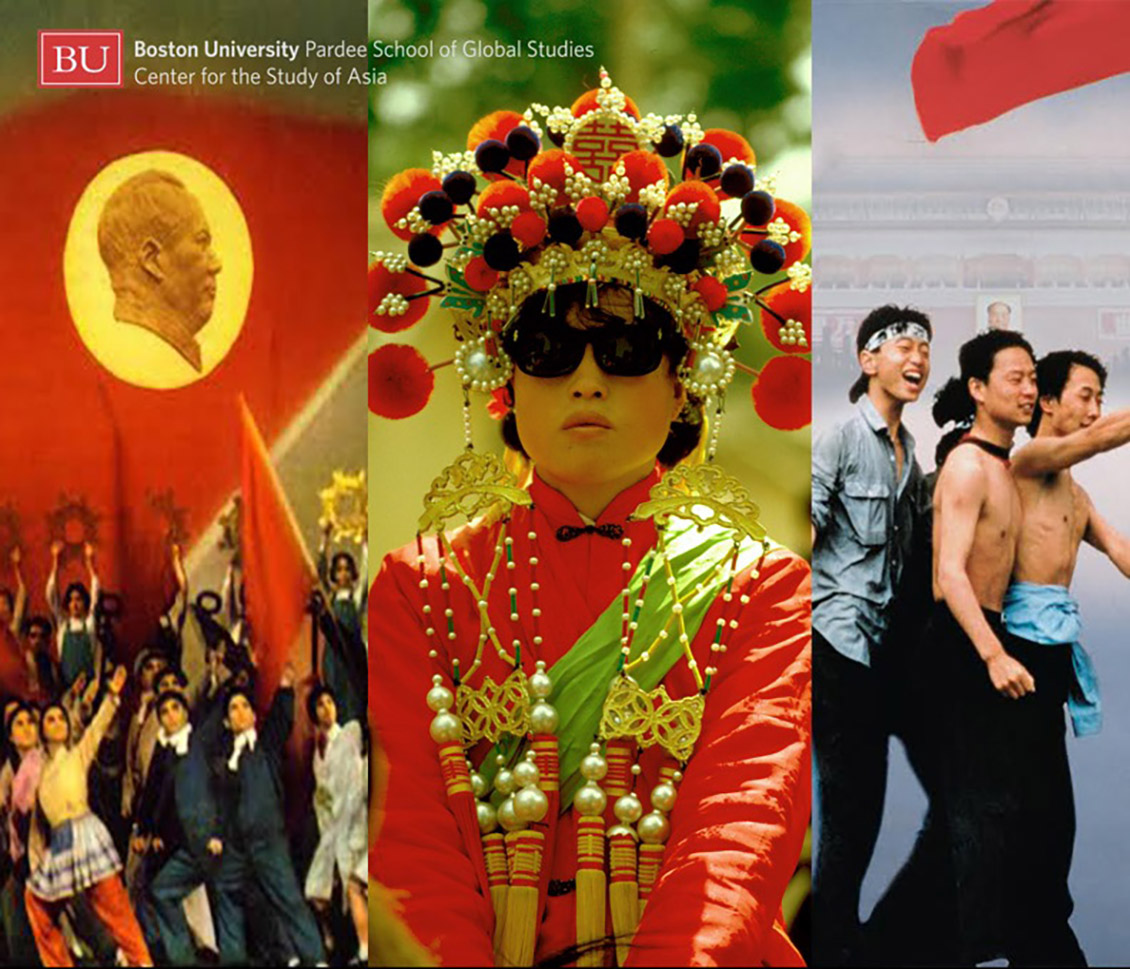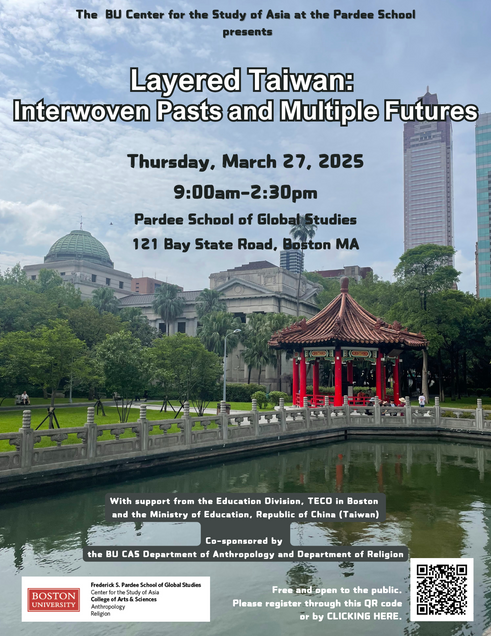History in Images, History in Words: In Search of Facts in Documentary Filmmaking
History in Images, History in Words:
In Search of Facts
in Documentary Filmmaking
A lecture by Carma Hinton
Robinson Professor of Visual Culture and Chinese Studies at George Mason University
Monday April 10, 2017 from 4-7 pm
at the Photonics Center (9th fl.), 8 St. Mary’s Street, Boston University
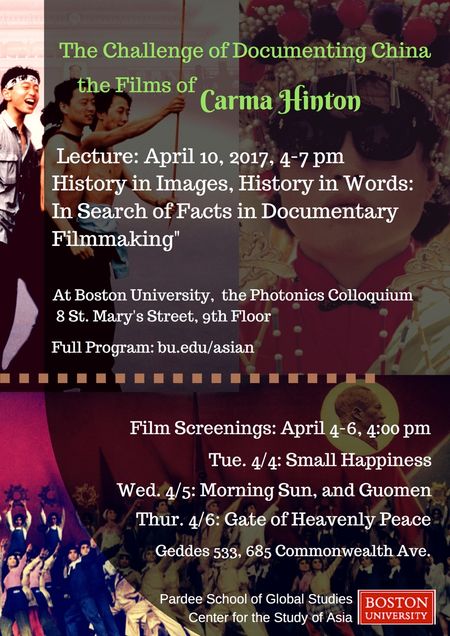 My presentation will focus on the process of documentary filmmaking, especially the many challenges my team and I faced in trying to create engaging filmic narratives that are both factually accurate and encompass multiple perspectives. I will use excerpts from my films as well as out-takes to illustrate the difficulties in determining what information to include and exclude, assess the compromises involved in the choices, and explore the consequences of taking various possible paths. I will also address the different problems that a historian encounters when presenting history in images as opposed to in words: the potential and limitation of each medium and what information each might privilege or obscure. I believe that in this age of “alternative facts” and “parallel universes,” reflections on the challenges in obtaining authenticity and truth and the importance of relentlessly striving to reach this goal, take on particularly urgent meaning.
My presentation will focus on the process of documentary filmmaking, especially the many challenges my team and I faced in trying to create engaging filmic narratives that are both factually accurate and encompass multiple perspectives. I will use excerpts from my films as well as out-takes to illustrate the difficulties in determining what information to include and exclude, assess the compromises involved in the choices, and explore the consequences of taking various possible paths. I will also address the different problems that a historian encounters when presenting history in images as opposed to in words: the potential and limitation of each medium and what information each might privilege or obscure. I believe that in this age of “alternative facts” and “parallel universes,” reflections on the challenges in obtaining authenticity and truth and the importance of relentlessly striving to reach this goal, take on particularly urgent meaning.
About the speaker:
Carma Hinton is an art historian and a filmmaker. She received her Ph.D. in Art History from Harvard University and is now Robinson Professor of Visual Culture and Chinese Studies at George Mason University. Together with Richard Gordon, Hinton has directed many documentary films, including Small Happiness, All Under Heaven, To Taste a Hundred Herbs, Abode of Illusion: The Life and Art of Chang Dai-chien, The Gate of Heavenly Peace, and Morning Sun. She has won two Peabody Awards, the American Historical Association’s John E. O’Connor Film Award, the International Critics Prize and the Best Social and Political Documentary at the Banff Television Festival, and a National News & Documentary Emmy, among others. Hinton is currently working on a book about Chinese scrolls depicting the theme of demon quelling. Carma Hinton was born in Beijing. Chinese is her first language and culture.

On Political Moods and Cold War Korean Film Melodrama
Global Asian Literary Studies Lecture Series
Thursday, February 13, 5 PM - 6:30 PM
Travis Workman (University of Minnesota)
725 Commonwealth Avenue, CAS 533, Boston MA
Also via zoom. Please register here.

Political Crisis, Chaos, and Citizens in South Korea
Tuesday, February 18, 4 PM-5:30 PM
Katharine H.S. Moon (Wellesley College)
Moderated by William Grimes (BU Pardee School)
121 Bay State Road, Boston MA
Please register here.

The lecture raises analytical questions about the strengths and weaknesses of Korea's democracy as highlighted by the declaration of martial law, impeachment, and societal responses to the crisis. How do we explain Yoon Seok Yeol's sudden and short-lived imposition of martial law and the society's quick rejection of the threat to democracy? How does the recent experience compare with past cases of martial law and impeachment? Will the crisis exacerbate political divisions within the society? Is there an upside to the crisis?
 Katharine H.S. Moon is professor emerita at Wellesley College, where she taught for thirty years in the Department of Political Science. She is the author of Sex Among Allies: Military Prostitution in U.S.-Korea Relations (Columbia University) and Protesting America: Democracy and the U.S.-Korea Alliance (University of California), along with academic articles on U.S.-Korea relations, democratization, social movements, migration, and women and politics, in Korea and East Asia. She was the inaugural holder of the Korea Studies Chair at The Brookings Institution (2014-16) and has appeared widely in international media on many topics related to the Koreas. Kathy Moon is a board member of the National Committee on North Korea.
Katharine H.S. Moon is professor emerita at Wellesley College, where she taught for thirty years in the Department of Political Science. She is the author of Sex Among Allies: Military Prostitution in U.S.-Korea Relations (Columbia University) and Protesting America: Democracy and the U.S.-Korea Alliance (University of California), along with academic articles on U.S.-Korea relations, democratization, social movements, migration, and women and politics, in Korea and East Asia. She was the inaugural holder of the Korea Studies Chair at The Brookings Institution (2014-16) and has appeared widely in international media on many topics related to the Koreas. Kathy Moon is a board member of the National Committee on North Korea.
Madame Moon Cheek: An Artistic Courtesan and Shii Mystic from Hyderabad Deccan
Wednesday, February 26, 4 PM - 6 PM
121 Bay State Road, Boston MA

The courtesan-poet-mystic Mahlaqa 'Chanda' (1768-1824) played an important political role in the Nizam's State in Hyderabad, India. The talk will focus on her artistic role in Urdu poetry and dance, her patronage of Shii piety with Sufi connections, and the architectural monuments that preserve her story for posterity.
Tango with Cows: Russian Futuris Poetics and the Global Tango Revolution
2025 Boston University Lecture Series in Literary Translation
Friday, February 28, 2:30 PM - 4:15 PM
Eugene Ostashevsky
725 Commonwealth Avenue, CAS 306, Boston MA

Madame Moon Cheek: An Artistic Courtesan and Shii Mystic from Hyderabad Deccan
Wednesday, February 26, 4 PM - 6 PM
Scott Kugle (Emory University)
121 Bay State Road, Boston MA

The courtesan-poet-mystic Mahlaqa 'Chanda' (1768-1824) played an important political role in the Nizam's State in Hyderabad, India. The talk will focus on her artistic role in Urdu poetry and dance, her patronage of Shii piety with Sufi connections, and the architectural monuments that preserve her story for posterity.
BUCSA Visiting Scholars’ Research Presentations
Tuesday, March 4, 2025, 5PM - 6:30PM
Pardee School of Global Studies
121 Bay State Road, Boston MA
Please register here.
Presentations:
WHAT CONSTITUTES A THREAT? Understanding State Discrimination against Religious Minorities in Indonesia with Hurriyah, BUCSA Visiting Scholar and Universitas Indonesia
Policy Transformation of Islamic Education in Postcolonial Indonesia with Abdurachman Assegaf, BUCSA Visiting Scholar and UIN Sunan Ampel Surabaya, Indonesia
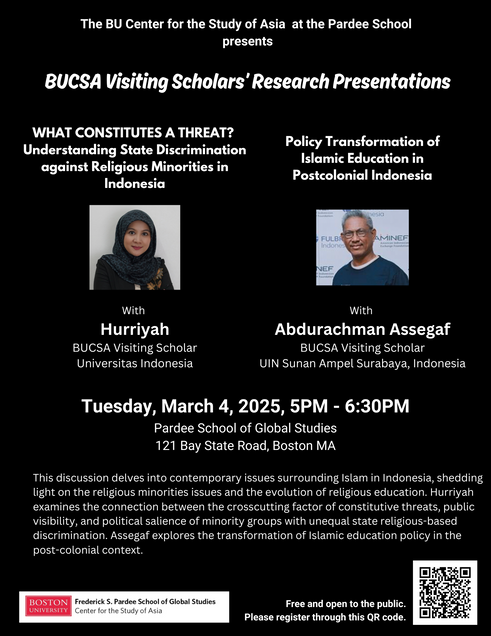
This discussion delves into contemporary issues surrounding Islam in Indonesia, shedding light on the religious minorities issues and the evolution of religious education. Hurriyah examines the connection between the crosscutting factor of constitutive threats, public visibility, and political salience of minority groups with unequal state religious-based discrimination. Assegaf explores the transformation of Islamic education policy in the post-colonial context.

Hurriyah is an Assistant Professor at the Department of Political Science and the Director of the Centre for Political Studies, Universitas Indonesia. She is also the chair of the Indonesian Scholar Network on Freedom of Religion or Beliefs (ISFORB). She researches religion and politics, Islam politics, gender, human rights, religious freedom, and religious minorities in Indonesia. She has 20 years of experience in academic and applied research that informs the government and non-government organisations on how to promote policy change in Indonesia.
Since 2019, Hurriyah has been investigating the politics of religious freedom in Indonesia, focusing on minority groups. She has also been actively engaging with local, national, and international scholars to make the issue better known. She is currently doing research on Rohingya minority threat issues in Indonesia, in partnership with the Asia Research Centre Universitas Indonesia (ARC UI) and the International Development Research Centre (IDRC). Her recent works have been published in the Journal of Asian Politics and Policy and the Journal of Southeast Asian Human Rights.
 Abdurachman Assegaf is a Professor at Sunan Ampel State Islamic University of Surabaya in Indonesia where he heads the Islamic education program. and the comparative politics of human rights, with a special focus on both policies on and governance for religious freedom. Prof. Assegaf obtained both his masteral and doctoral degrees from UIN Sunan Kalijaga Yogyakarta in education and Islamic Studies, respectively. He also held various academic positions in Indonesia prior to his current position. As an established academic, Prof. Assegaf has a solid track record in research engagement and publications in various academic outlets.
Abdurachman Assegaf is a Professor at Sunan Ampel State Islamic University of Surabaya in Indonesia where he heads the Islamic education program. and the comparative politics of human rights, with a special focus on both policies on and governance for religious freedom. Prof. Assegaf obtained both his masteral and doctoral degrees from UIN Sunan Kalijaga Yogyakarta in education and Islamic Studies, respectively. He also held various academic positions in Indonesia prior to his current position. As an established academic, Prof. Assegaf has a solid track record in research engagement and publications in various academic outlets.
Populism Brought Down? The Marcos-Duterte Struggle in Philippine Politics
Monday, March 17, 5 PM - 6:30 PM
Mark R. Thompson (City University of Hong Kong)
Populism Brought Down? The Marcos-Duterte Struggle in Philippine Politics
121 Bay State Road, Boston MA
Please register here.
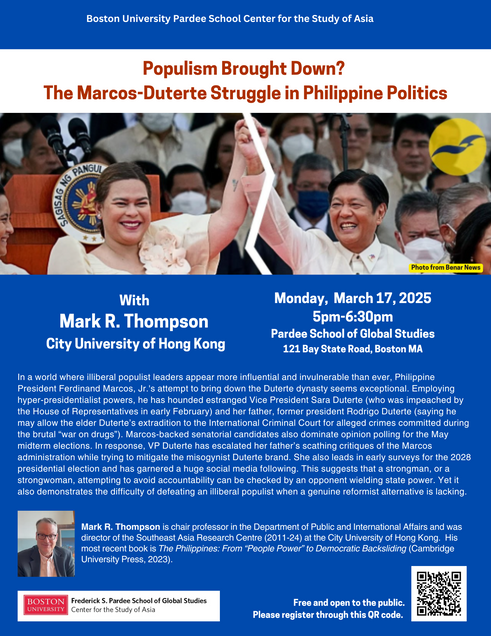
In a world where illiberal populist leaders appear more influential and invulnerable than ever, Philippine President Ferdinand Marcos, Jr.'s attempt to bring down the Duterte dynasty seems exceptional. Employing hyper-presidentialist powers, he has hounded estranged Vice President Sara Duterte (who was impeached by the House of Representatives in early February) and her father, former president Rodrigo Duterte (saying he may allow the elder Duterte’s extradition to the International Criminal Court for alleged crimes committed during the brutal “war on drugs”). Marcos-backed senatorial candidates also dominate opinion polling for the May midterm elections. In response, VP Duterte has escalated her father’s scathing critiques of the Marcos administration while trying to mitigate the misogynist Duterte brand. She also leads in early surveys for the 2028 presidential election and has garnered a huge social media following. This suggests that a strongman, or a strongwoman, attempting to avoid accountability can be checked by an opponent wielding state power. Yet it also demonstrates the difficulty of defeating an illiberal populist when a genuine reformist alternative is lacking.
 Mark R. Thompson is chair professor in the Department of Public and International Affairs and, from 2011 to 2024, was director of the Southeast Asia Research Centre, City University of Hong Kong. He was also president of the Hong Kong Political Science Association from 2018 to 2020. In 2008-2009 he was Lee Kong Chian Distinguished Fellow at Stanford University as wll as the National University of Singapore and held a research fellowship at the Center for Southeast Asian Studies, Kyoto University in 2024. His current Southeast Asia-focused research concentrates on opposition to autocratization, authoritarian nostalgia, populism, presidentialism, and women dynastic leaders. According to the 2024 Stanford/Elsevier rankings, he is among the world’s top 2% most-cited scientists in the subfield of “Political Science & Public Administration”. The author or editor of 11 books and over 150 articles and book chapters, his most recent book is The Philippines: From “People Power” to Democratic Backsliding (Cambridge University Press, 2023).
Mark R. Thompson is chair professor in the Department of Public and International Affairs and, from 2011 to 2024, was director of the Southeast Asia Research Centre, City University of Hong Kong. He was also president of the Hong Kong Political Science Association from 2018 to 2020. In 2008-2009 he was Lee Kong Chian Distinguished Fellow at Stanford University as wll as the National University of Singapore and held a research fellowship at the Center for Southeast Asian Studies, Kyoto University in 2024. His current Southeast Asia-focused research concentrates on opposition to autocratization, authoritarian nostalgia, populism, presidentialism, and women dynastic leaders. According to the 2024 Stanford/Elsevier rankings, he is among the world’s top 2% most-cited scientists in the subfield of “Political Science & Public Administration”. The author or editor of 11 books and over 150 articles and book chapters, his most recent book is The Philippines: From “People Power” to Democratic Backsliding (Cambridge University Press, 2023).
Layered Taiwan: Interwoven Pasts and Multiple Futures
Thursday, March 27, 9 AM - 2:30 PM
121 Bay State Road, Boston MA
Please register here.
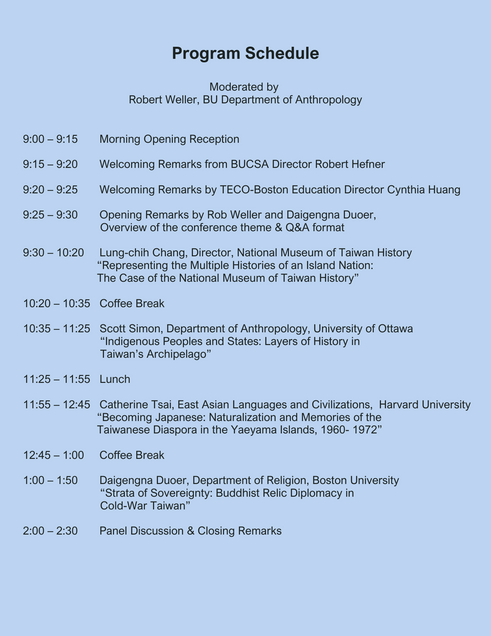
Translating Arabic Theory: Portable Concepts for a New Lexicon
2025 Boston University Lecture Series in Literary Translation
Friday, March 28, 2:30 PM - 4:15 PM
Anna Ziajka Stanton
725 Commonwealth Avenue, CAS 306, Boston MA

Populism, Religion, and Nationalism in Asia: Analyzing Muslim Majorities and Minorities
Tuesday, April 1, 5 PM - 6:30 PM
Ahmet Kuru (San Diego State University)
121 Bay State Road, Boston MA
Please register here.


